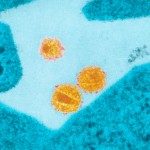Lien vers Pubmed [PMID] – 21147466
Cell Host Microbe 2010 Dec;8(6):523-33
The WHIM syndrome, which features high susceptibility to human papillomavirus (HPV) infection, is a rare immunodeficiency associated with autosomal dominant heterozygous mutations of the CXCR4 chemokine receptor. CXCL12 and its receptors, CXCR4 and CXCR7, are linked to tumorigenesis, and we reported that abnormal expression of CXCL12 in epidermal keratinocytes correlates with HPV infection. However, the HPV-related pathologies observed in WHIM patients remain mechanistically unexplained. We show that keratinocytes immortalized by oncogenic HPV16 or HPV18 upregulate CXCL12 and its receptors in a manner dependent upon expression of the viral proteins E6 and E7. Autocrine signaling activated by CXCL12-engagement of its receptors controls motility and survival of the infected cells. Strikingly, expression of a WHIM syndrome-related gain-of-function CXCR4 mutant confers transforming capacity to HPV18-immortalized keratinocytes. These results establish a pivotal role for CXCL12 signaling in HPV-mediated transformation and provide a mechanistic basis for understanding HPV pathogenesis in WHIM syndrome.

